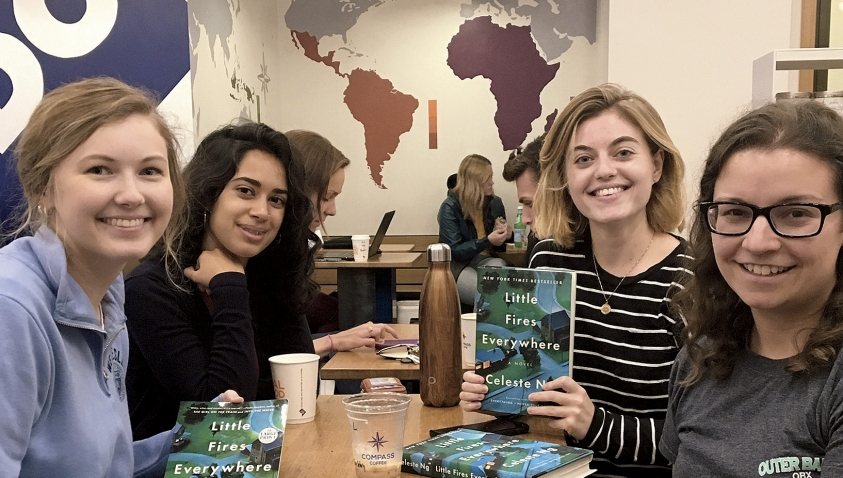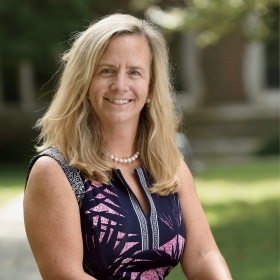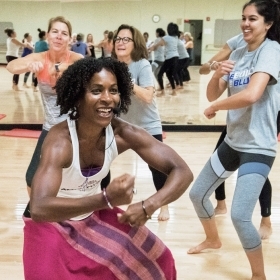Gabi Vesey ’18, Diya Ram ’15, Hadley Chase ’15, and Brittany Lamon-Paredes ’15 at a recent book club meeting in Washington, D.C.
When Hadley Chase ’15 moved to Washington, D.C., after graduation, she landed in the city knowing only one other person. Her solution was to head to the Washington Wellesley Club’s young alum book group. “I figured this would be a good way to make new friends. And it was!” Chase says.
Chase eventually became the young alumnae coordinator for the D.C. club, running and moderating the book club. Gabi Vesey ’18 took the reins of the group last fall and hosted her first book discussion in September 2018.
We asked Chase and Vesey to give some tips for getting a young alum book club up and running.
What do you need to get a book club going?
Chase: You don’t need much! I found it was easiest to start with asking my friends if they were interested in joining. That way we had a core group of three to five people, who I knew would attend most meetings. Then we branched out to others.
Advertising through Facebook groups and events has worked best, but there is no substitute for reaching out directly. When a new member attended a meeting, we would text them before the next meeting to say, “Hey, we really enjoyed discussing X book with you, we hope you can make it on this time and date.” It can have a huge impact to let people know that you valued their presence.
If you’re starting a book club through the Wellesley network, I highly recommend reaching out to folks who just graduated. A lot of those people will have just moved to a new city and are looking to get in touch with other Wellesley folks.
How do you pick books?
Chase: I usually just let the people at the meeting decide the book for the next meeting. I figure that those are the people most likely to show up to meetings anyway, so if there is a book someone has been dying to read, that’s the best way to boost attendance. We [also] try to support Wellesley authors as much as possible.
Vesey: For my very first book club, I got advice from my dad, who is a librarian, on what book to pick. I settled on Little Fires Everywhere. It’s a pretty popular book at the moment and was picked up by Hulu to become a TV series. I felt that this would attract more people!
Who leads the discussion?
Vesey: I downloaded some questions from the author of the book to lead the discussion. You’ll find that “book club” type books have discussion questions already made if you search on the internet. After a few prepared questions, the conversation just flows.
Chase: I would lead discussions myself, but there was a lot of give and take with the group. People asked each other questions and drove home different points. It didn’t take a lot of preparation. I’d come in with a few questions and passages I wanted to discuss.
Where do you meet?
Chase: We’ve rotated meeting locations. We often meet at one of the Smithsonian museums in their public atrium. We’ve also done public parks, and my own home. Attendance has been slightly higher when people host at their own homes, and it’s also easier to serve snacks and drinks there, so as long as someone has a centrally located, easily accessible house, that works well.
Vesey: [For my first meeting,] I decided to hold it at the National Portrait Gallery. The museum is free, and there’s an indoor courtyard with lots of chairs and tables set up for people.
What’s the best way to make it inclusive?
Chase: Be appreciative when people show up, and make an effort to get to know them. It’s not easy for people with full-time jobs to commit to reading a book every month and to attend a meeting. So when they do, let them know that you’re really glad they could make it and you want to know what they thought about the book.
We make an effort to choose books that are accessible through our local public library. Unfortunately, that can sometimes mean they are not the newest selections, but the D.C. libraries do have a very good selection. If we are reading something not available through the library, I’ll often just buy a copy myself, read it quickly, and then lend it to other members.
Any final tips?
Chase: Don’t be discouraged if attendance is low. I’ve had meetings where no one shows up before. I promise, it’s not because they hate you or the book club, it’s just because there are busy times of year when people can’t commit to extra activities. They’ll come next time.








We ask that those who engage in Wellesley magazine's online community act with honesty, integrity, and respect. (Remember the honor code, alums?) We reserve the right to remove comments by impersonators or comments that are not civil and relevant to the subject at hand. By posting here, you are permitting Wellesley magazine to edit and republish your comment in all media. Please remember that all posts are public.